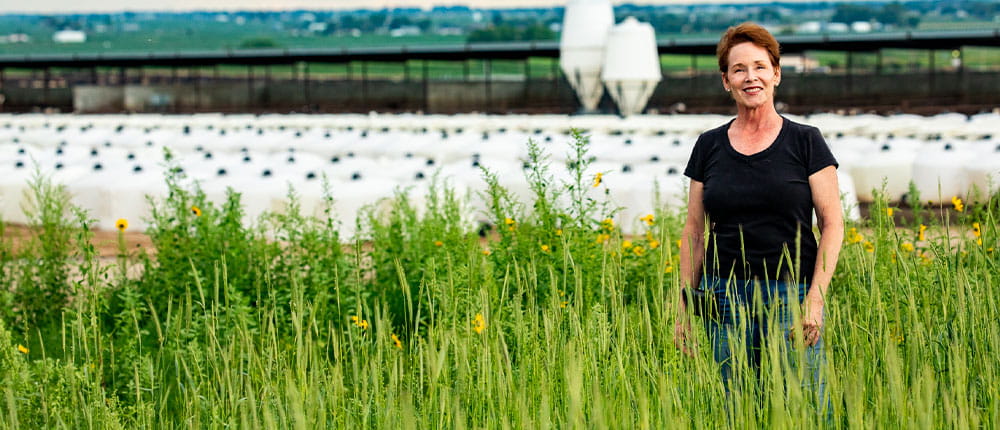Mary Kraft, co-owner of 6,000-cow Quail Ridge Dairy near Fort Morgan, Colo., makes community service a priority, serving her industry locally and on the global stage.
A past president of the Colorado Livestock Association, she chairs the Dairy MAX board, serves on the Agfinity (cooperative) board of directors and Colorado State University sustainability advisory board, and was recently chosen to represent the U.S. dairy industry on the Food and Agriculture Organization of the United Nations.
Why do you choose to lead?
I lead because my parents were 4-H leaders and they were constantly contributing to the good of all. They believed we should leave the world a better place and, to me, that's what you do with the cards you’ve been dealt. I think I have some things to offer, and it seems wrong to hide my light under a bushel basket.
I am very community-minded. I want to put something back into the community bucket, because that’s how communities thrive rather than just survive. I’m also interested in having a front-row seat to how business decisions are made. For me, that is one of the most compelling parts of being involved with a co-op board.
What value do you take from cooperative leadership?
As part of a cooperative board, you know the decisions you are making are going to happen. When you have the fiduciary duty to pay attention to members’ money, you feel very strongly about how you are representing that and what you’re doing to make a good return on an investment.
Leadership is its own reward, too. You get to see whether what you did made a difference, although sometimes it takes a while for that to happen.
How do you make an impact?
The world is run by those who show up. You can help the world move forward because of the skillsets you have. If you show up, often you’re the one who gets the opportunity to shape the world.
As a woman, my No. 1 trick is to ask questions — but that should probably be the No. 1 trick all of us have for engaging people in conversation and getting the conversation to move ahead.
How can cooperatives encourage more people to step into leadership roles?
One of the things we have at Agfinity is an associate director program. We put associate directors on the board and, while they are nonvoting members, they have a voice on choosing new leaders and business decisions.
Spending a year getting up to date allows them to hit the ground running and be a productive, contributing board member when they are elected to a board position.
What happens with some cooperatives is that board service is almost like a hereditary rite. You hear people say, "My dad was on the co-op board; therefore, I’m on the co-op board."
I appreciate that loyalty to the family brand and feeling like Dad contributed something to the community and wanting to see that legacy go forward, but that shouldn’t be the main reason you want to be a board member. You should be a board member because you’re dying to contribute to that organization.
Is it hard to find people to step into those roles?
I think so, and part of it has to do with time constraints. People have to choose between that and their family needs. In our case, it’s a whole day for each Agfinity board meeting including travel time, so it’s a fairly large commitment. And you’re making decisions on behalf of the board, so it’s not for the faint of heart.
We always are interested in young people being on boards, but it’s not that easy. In our operation, I’m on several boards and my husband is on a board, so our son needs to be at home running things while we’re away.
You want my old brain because I've been around the block and have seen some things, but you also want our son’s enthusiasm and his "why the heck not" approach.
Women are still in the minority in leadership roles in agriculture. Can that change?
What a shame to not be putting half the available horsepower into our industry. I hope it’s changing as we see more young women come into farming.
I grew up about 80 miles from here, down by Denver. My brother still has a dairy and milks about 600 cows. It was very apparent to me that girls don’t inherit farms, and while I really liked the cows and I really wanted the business concept, I couldn't have that dairy because it needed to go to the men.
But now we see farm families with daughters who are out there doing the work and they will inherit the land. They’re out there swatting mosquitos and figuring out how to rewire the electrical panel on their sprinkler. They can do it. It just hasn’t been traditionally how it’s been done.
When I was young, my grandpa always said, "Little girls should be seen and not heard." I heard that loud and clear and thought, "I don't think you're right, Grandpa." All of that goes into your satchel, and you think, "What am I going to do with that?"
I hope that other women say, "I want to be part of how we buy and sell commodities. I want to be part of keeping my community together."
Check out the full fall 2023 C Magazine with an article about Kraft’s dairy operation and more.




